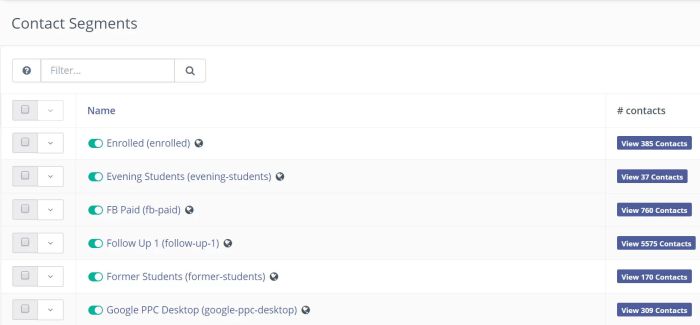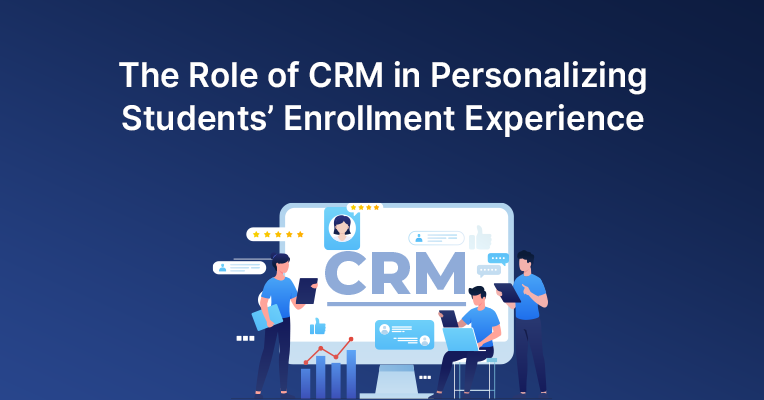
Revolutionizing Student Enrollment: How CRM is Transforming Higher Education
In today’s competitive educational landscape, attracting and retaining students is paramount for the success of any institution. Gone are the days of relying solely on traditional marketing methods and manual processes. To thrive, colleges and universities need to embrace modern technologies that streamline operations, enhance communication, and personalize the student experience. This is where Customer Relationship Management (CRM) systems with specialized student enrollment features come into play.
Beyond Sales: The Evolution of CRM in Education
While CRM is often associated with sales and marketing in the business world, its principles are equally applicable, and arguably even more impactful, in the realm of education. At its core, a CRM is a technology for managing all of an institution’s relationships and interactions with prospective students, current students, alumni, and even faculty and staff. It provides a centralized platform to store data, track communications, and automate processes, ultimately leading to improved efficiency, better decision-making, and a more positive experience for everyone involved.
The traditional student enrollment process is often fragmented, involving multiple departments, disparate systems, and manual data entry. This can lead to inefficiencies, errors, and a frustrating experience for prospective students. A CRM with dedicated student enrollment features addresses these challenges by providing a unified solution that streamlines every stage of the enrollment journey, from initial inquiry to matriculation.
Key Features of a CRM for Student Enrollment
A robust CRM for student enrollment goes beyond basic contact management. It offers a comprehensive suite of features designed to attract, engage, and convert prospective students. Here are some key capabilities to look for:
-
Lead Management and Nurturing: The CRM should be able to capture leads from various sources, such as website forms, social media campaigns, and recruitment events. It should then allow institutions to segment these leads based on demographics, academic interests, and other relevant criteria. Automated email campaigns, personalized content, and targeted communication can then be used to nurture these leads and guide them through the application process.
-
Application Management: A CRM can streamline the application process by providing an online portal where prospective students can submit their applications, upload supporting documents, and track their application status. The system can also automate tasks such as sending reminders for missing documents, scheduling interviews, and notifying applicants of admission decisions.
-
Communication Management: Effective communication is crucial for building relationships with prospective students. A CRM should facilitate seamless communication through multiple channels, including email, SMS, phone calls, and even social media. It should also allow institutions to track all interactions with each student, providing a complete history of their engagement.
-
Event Management: Recruitment events, such as college fairs, open houses, and campus tours, are essential for attracting prospective students. A CRM can help institutions manage these events by tracking attendance, capturing leads, and following up with attendees after the event.
-
Reporting and Analytics: A CRM provides valuable insights into the effectiveness of recruitment efforts. It can generate reports on key metrics such as application volume, acceptance rates, and yield rates. This data can be used to identify areas for improvement and optimize recruitment strategies.
-
Integration with Other Systems: A CRM should integrate seamlessly with other systems used by the institution, such as the student information system (SIS), learning management system (LMS), and financial aid system. This integration ensures that data is consistent across all systems and eliminates the need for manual data entry.
-
Workflow Automation: Automate repetitive tasks such as sending confirmation emails, assigning tasks to admissions counselors, and generating reports. This frees up staff time to focus on more strategic initiatives.
-
Personalized Communication: Tailor communications to each student’s individual interests and needs. This can be done by segmenting students based on demographics, academic interests, and other criteria.
-
Mobile Accessibility: Ensure that the CRM is accessible on mobile devices. This allows admissions counselors to stay connected with students and manage their tasks from anywhere.
Benefits of Implementing a CRM for Student Enrollment
Implementing a CRM with student enrollment features offers a multitude of benefits for colleges and universities:
-
Increased Enrollment Rates: By streamlining the application process, improving communication, and personalizing the student experience, a CRM can help institutions attract and convert more prospective students.
-
Improved Efficiency: Automating tasks and centralizing data can significantly reduce administrative burden and free up staff time to focus on more strategic initiatives.
-
Enhanced Student Experience: A CRM can provide a more personalized and engaging experience for prospective students, making them feel valued and supported throughout the enrollment process.
-
Better Data-Driven Decision Making: The reporting and analytics capabilities of a CRM provide valuable insights into the effectiveness of recruitment efforts, allowing institutions to make more informed decisions about their strategies.
-
Improved Communication and Collaboration: A CRM can facilitate seamless communication and collaboration between different departments involved in the enrollment process, such as admissions, marketing, and financial aid.
-
Cost Savings: While there is an initial investment in implementing a CRM, the long-term benefits, such as increased enrollment rates and improved efficiency, can lead to significant cost savings.
Choosing the Right CRM for Your Institution
Selecting the right CRM for student enrollment is a critical decision. Consider these factors:
-
Specific Needs: What are the specific challenges and goals of your institution’s enrollment process? Identify the features and functionalities that are most important to you.
-
Budget: CRMs vary in price, so it’s important to establish a budget before you start shopping.
-
Scalability: Choose a CRM that can scale with your institution as it grows.
-
Ease of Use: The CRM should be user-friendly and easy to learn, so that staff can adopt it quickly.
-
Integration Capabilities: Ensure that the CRM integrates seamlessly with your existing systems.
-
Vendor Support: Choose a vendor that offers excellent customer support and training.
Some popular CRM platforms that offer specialized solutions for student enrollment include:
-
Salesforce Education Cloud: A comprehensive CRM platform designed specifically for higher education.
-
Microsoft Dynamics 365: A flexible CRM platform that can be customized to meet the specific needs of educational institutions.
-
Slate by Technolutions: A CRM specifically built for college admissions and enrollment management.
-
HubSpot: While known for marketing, HubSpot can be adapted for enrollment management with careful configuration and integrations.
The Future of CRM in Education
The use of CRM in education is only going to continue to grow in the years to come. As technology evolves, we can expect to see even more sophisticated features and capabilities, such as:
-
Artificial Intelligence (AI): AI can be used to personalize the student experience even further, by providing tailored recommendations for courses, programs, and career paths.
-
Chatbots: Chatbots can be used to answer common questions from prospective students and provide them with instant support.
-
Predictive Analytics: Predictive analytics can be used to identify students who are at risk of dropping out and provide them with targeted interventions.
Conclusion
In conclusion, a CRM with student enrollment features is an essential tool for colleges and universities that want to attract, engage, and retain students in today’s competitive environment. By streamlining operations, enhancing communication, and personalizing the student experience, a CRM can help institutions achieve their enrollment goals and create a more positive experience for everyone involved. Investing in the right CRM is an investment in the future of your institution. It allows for better data-driven decisions, improved efficiency, and, most importantly, a more positive and successful journey for each student from prospect to graduate. By embracing this technology, educational institutions can navigate the complexities of modern enrollment and thrive in a rapidly evolving landscape.

